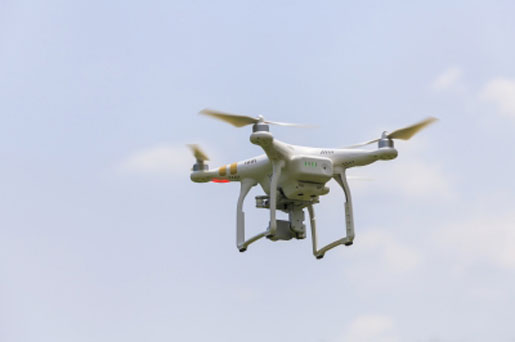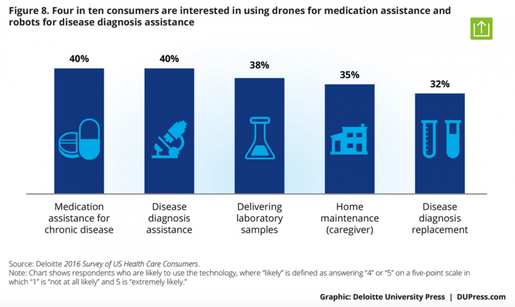Bring on the Drones and Robots
Forget fears of a dystopian world controlled by artificial intelligence and robots. Patients are enthusiastic about the potential positives drones, robots, and other technology could bring to healthcare.
September 12, 2016

Forget fears of a dystopian world controlled by artificial intelligence and robots. Patients are enthusiastic about the potential positives drones, robots, and other technology could bring to healthcare.
Who is worried about a future full of drones and robots? Not U.S. healthcare consumers. Turns out, we are pretty interested in taking advantage of technology-enabled healthcare and would welcome drones and robots for help in diagnosing and managing diseases.
That was one of the findings from the Deloitte 2016 Survey of U.S. Health Care Consumers. The survey asked 3751 American adults about technology-enabled healthcare, focusing on sensors and Internet of Things technology, telemedicine and remote patient monitoring, and robotics and drones.
Take part in the "Product Development with Sensors" track at the MD&M Minneapolis Conference on Thursday, September 22. |
That Deloitte survey found that 70% of consumers would probably use at least one of these technologies and that telemedicine was the most preferred, with about 50% of respondents saying they were interested in using it. More of these consumers saw themselves using telemedicine for post-operative care and for keeping tabs on their chronic conditions, rather than for minor injuries and for healthcare on the road.
Of healthcare consumers, caregivers were most likely to use technologies like remote monitoring and telemedicine as part of their duties. This finding is supported by other reports that family caregivers are looking for products and services that offer value and improve health outcomes; AARP forecasts that this market will reach $279 billion by 2020. Patients with chronic conditions expressed the most interest in technology-enabled care, and the severity of their conditions correlated with their interest level.
While there are already medical technologies that offer remote monitoring or incorporate a telemedicine element, drones and robots seem a little more futuristic. With the exception of robotic-assisted surgery, robots and drones are not yet mainstream in personal healthcare. But the Deloitte survey authors envisioned a few potential situations where a drone or robot could be useful--delivering medication and lab samples, diagnosing diseases, and offering home caregiving--and asked respondents how interested they were in using drones or robots for those capabilities.
Their interest is shown in the figure below. A surprisingly high number of consumers are seemingly accepting of technology that isn't even available to them yet.

Of course, interest in a technology doesn't necessarily mean it will be used. The Deloitte survey authors wrote that "the gap between interest and use is substantial," noting that although about 38% of caregivers surveyed were interested in using remote patient monitoring, only 7% have used or currently use it.
About two-thirds of the consumers surveyed expressed concerns about adopting telemedicine and remote patient monitoring. Those concerns were mainly around ensuring high-quality, personal, secure care via these technologies. Another issue that could impact future adoption of these technologies is the issue of paying for it. A large majority (about 80%) of the surveyed consumers said insurers should pay for remote monitoring and telemedicine.
As the survey authors wrote, "Yes, consumers are open to technology-aided care, but providers will likely need to earn their trust on both quality of care and protection of patient information."
[Image courtesy of NAYPONG/FREEDIGITALPHOTOS.NET]
About the Author(s)
You May Also Like


